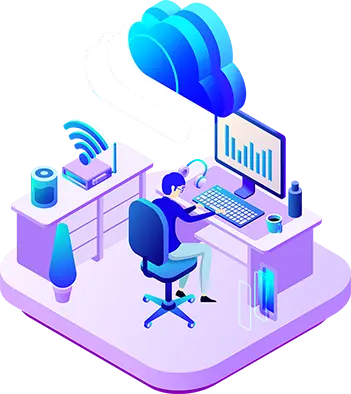
What is a AWS cloud practitioner?
The AWS Certified Cloud Practitioner is an entry-level certification offered by Amazon Web Services (AWS). It is designed for individuals who are new to AWS and cloud computing and want to gain a foundational understanding of AWS services, cloud concepts, and the basics of working with AWS technologies. The AWS Cloud Practitioner certification is a great starting point for beginners who wish to pursue a career in cloud computing or AWS-related roles. Here are key details about the AWS Certified Cloud Practitioner certification:
Prerequisites
There are no specific prerequisites for the AWS Cloud Practitioner certification. It is open to anyone interested in learning about AWS and cloud computing. However, having a general understanding of IT concepts can be helpful.
Exam Content: The certification exam covers the following domains:
Cloud Concepts (26%)
This section covers fundamental cloud computing concepts, the benefits of cloud computing, and the differences between traditional on-premises IT environments and cloud environments.
AWS Services and Offerings (25%)
This section introduces AWS services, such as computing, storage, databases, and networking. It also provides an overview of AWS global infrastructure and pricing models.
Architectural Best Practices (30%)
This domain explores AWS architectural best practices, including high availability, scalability, and security. It covers AWS Well-Architected Framework principles.
Account Management (19%)
This section explains AWS account setup and management, including billing and cost management, as well as AWS Identity and Access Management (IAM).
Exam Format
The AWS Certified Cloud Practitioner exam is multiple-choice and multiple-answer format. It consists of approximately 65 questions, and candidates have 90 minutes to complete the exam.
Passing Score
To pass the exam and earn the AWS Certified Cloud Practitioner certification, candidates must achieve a passing score determined by AWS.
Benefits of the AWS Cloud Practitioner Certification
Foundational Knowledge: The certification provides a solid foundation in AWS services and cloud computing concepts, making it an excellent starting point for further AWS certifications.
Career Opportunities
It can open the door to entry-level positions in cloud-related roles, such as cloud support associate, cloud solutions architect associate, or cloud developer associate.
Validation of Skills
Earning the certification demonstrates your commitment to learning AWS and validates your cloud knowledge to potential employers.
Preparation for Advanced Certifications
It serves as a stepping stone to more advanced AWS certifications, such as the AWS Certified Solutions Architect, AWS Certified Developer, or AWS Certified SysOps Administrator.
Business and Project Understanding
Understanding cloud fundamentals helps professionals make informed decisions regarding cloud adoption and project planning.
The AWS training in Chandigarh Certified Cloud Practitioner certification is an excellent choice for individuals who want to get started with AWS and cloud computing. It’s particularly suitable for individuals who may not have extensive technical experience but want to understand the foundational principles of AWS services and cloud technology.
What is the basic knowledge to learn AWS?
To learn AWS (Amazon Web Services), you can start with the following basic knowledge areas and concepts. These form the foundation for understanding AWS services and cloud computing in general:
Basic IT Concepts
Understand fundamental IT concepts like servers, networks, databases, and storage.
Familiarize yourself with operating systems, such as Windows and Linux.
Cloud Computing Fundamentals
Learn about cloud computing concepts, including the benefits of cloud, service models (IaaS, PaaS, SaaS), and deployment models (public, private, hybrid).
Networking Basics
Gain a basic understanding of networking concepts like IP addresses, subnets, DNS, and firewalls.
Learn about common networking protocols (e.g., HTTP, TCP/IP) and concepts such as load balancing.
Virtualization
Understand the concept of virtualization, which is the foundation of cloud computing.
Learn about virtual machines (VMs) and hypervisors.
Storage Basics
Familiarize yourself with different types of storage, including block storage and object storage.
Learn about file systems and storage protocols (e.g., NFS, SMB).
Databases
Get acquainted with relational databases (SQL databases) and NoSQL databases.
Understand basic database concepts like tables, records, and queries.
Security Fundamentals
Learn about security principles, including authentication, authorization, and encryption.
Understand security best practices and the importance of data protection.
Operating Systems
Gain proficiency in using both Windows and Linux operating systems, as AWS supports various operating systems.
Command Line Interface (CLI)
Familiarize yourself with using the command line, especially in a Linux environment, as it’s often used in AWS operations.
Programming Basics
Learn a programming language like Python, which is widely used for scripting and automation in AWS.
Understand basic programming concepts like variables, data types, and control structures.
Web Services Concepts
Learn about web services, including RESTful APIs and SOAP, as many AWS services are accessible through APIs.
Basic AWS Concepts
Start with the basics of AWS services, including AWS regions, availability zones, and global infrastructure.
AWS Service Categories
Categorize AWS services into various categories, such as compute, storage, networking, and databases.
AWS Identity and Access Management (IAM)
Learn the fundamentals of IAM to manage user access to AWS resources.
EC2 Instances
Understand Amazon EC2 (Elastic Compute Cloud) instances, which are virtual servers in the cloud.
Learn how to create, launch, and manage EC2 instances.
S3 (Simple Storage Service)
Explore Amazon S3, an object storage service, and understand how to store and retrieve data from S3 buckets.
Networking in AWS
Learn about AWS VPC (Virtual Private Cloud) and networking concepts like subnets, security groups, and route tables.
Security Groups and NACLs
Understand AWS security groups and network access control lists (NACLs) for controlling inbound and outbound traffic.
AWS CLI and AWS Management Console
Get familiar with the AWS Command Line Interface (CLI) and the AWS Management Console for interacting with AWS services.
Billing and Cost Management
Learn about AWS billing and cost management concepts, including AWS pricing models and billing alerts.
Starting with these fundamental areas will provide you with the necessary knowledge to explore AWS course in Chandigarh sector 34 It services and continue your learning journey in cloud computing and AWS-specific technologies. AWS offers extensive documentation, tutorials, and training resources to help you dive deeper into specific services and topics as you progress.
Read more article:- Expressmagzene.

